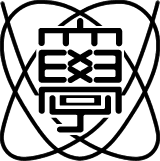The University of Electro-Communications (電気通信大学, Denki-Tsūshin Daigaku) is a national university in the city of Chōfu, Tokyo, Japan.
電気通信大学 | |
 | |
| Type | National |
|---|---|
| Established | 1945 - The Central Technical Institute for Wireless-Communications 1918 - The Technical Institute for Wireless-Communications |
| President | Takashi Fukuda[1] |
Administrative staff | 250 |
| Undergraduates | 3800 |
| Postgraduates | 1500 |
| Location | , , |
| Campus | Urban |
| Colors | (DIC-256) |
| Website | www.uec.ac.jp |

It specialises in the disciplines of computer science, the physical sciences, engineering and technology. It was founded in 1918 as the Technical Institute for Wireless-Communications.[2]
History edit
The University of Electro-communications was founded in the Azabu district, Tokyo city as the Technical Institute for Wireless-Communications by Wireless Association in 1918. The Technical Institute for Wireless-Communications was transferred to the Ministry of Communications in 1942 and renamed to the Central Technical Institute for Wireless-Communications in 1945. Following to the transfer from the Ministry of Communications to the Ministry of Education in 1948, the University of Electro-communications was established as a national university in 1949. The campus was moved to the city of Chōfu, Tokyo in 1957. The university has been run by the National University Corporation since 2004.[2][3]
School symbol edit
The school symbol was set in 1949. The design shows a Lissajous figure of the frequency ratio of 5 to 6 with Kanji character "学" which means "University". The frequency ratio of 5 to 6 means the commercial power frequency of 50 Hz (eastern Japan) and 60 Hz (western Japan), and indicates Japan-wide harmonization. The meaning of school symbol is common with that of school name which is "to establish an university which is open to all over Japan, by call it by a name without any geographical name".[3]
Rankings edit
| University rankings | |
|---|---|
| Regional – Overall | |
| THE Asia[4] | 801-1000 (2017) |
Global edit
The Times Higher Education World University Rankings 2018 ranks UEC in the bracket of the 801-1000 best universities in the world.[5]
Organisation edit
Faculties edit
- Faculty of Electro-Communications (until 2010)
- Information and Communication Engineering
- Computer Science
- Electronic Engineering
- Applied Physics and Chemistry
- Mechanical Engineering and Intelligent Systems
- Systems Engineering
- Human Communications
- Faculty of Informatics and Engineering (since 2010)
- Informatics
- Communication Engineering and Informatics
- Mechanical Engineering and Intelligent Systems
- Engineering Science
- Fundamental Programs for Advanced Engineering
Graduate schools edit
- Graduate School of Electro-Communications (Until 2010)
- Information and Communication Engineering
- Computer Science
- Electronic Engineering
- Applied Physics and Chemistry
- Mechanical Engineering and Intelligent Systems
- Systems Engineering
- Human Communication
- Graduate School of Informatics and Engineering (Since 2010)
- Informatics
- Communication Engineering and Informatics
- Mechanical Engineering and Intelligent Systems
- Engineering Science
- Graduate School of Information Systems
- Human Media Systems
- Social Intelligence and Informatics
- Information Network Systems
- Information on System Fundamentals
Centers for Education and Research edit
- Institute for Laser Science
- Advanced Wireless Communication Research Center(AWCC)
- Center for Space Science and Radio Engineering (SSRE)
- Center for Frontier Science and Engineering
- Center for Photonic Innovation
- Research Center for Ubiquitous Networking and Computing
- Advanced Ultrafast Laser Research Center
- Innovation Research Center for Fuel Cells
Notable faculty edit
- Kwan-ichi Terazawa - mathematician and member of the Japan Academy
- Noriaki Kano - consultant in quality management, recipient of the Deming Prize (1997), and also known for Kano model
- Masahiro Mori - roboticist
- Kanji Nishio - German literary figure and philosopher
- Te Sun Han - information theorist and recipient of the Shannon Award (2010)
- Hisaki Matsuura - poet and novelist
Notable alumni edit
Businesspersons edit
- Ken Kutaragi, B.E. in Electronic Engineering in 1975 - former CEO of Sony Computer Entertainment, current Honorary Chairman of Sony Corporation, and also known as Father of PlayStation
- Kōichi Nakamura - video game designer and founder of Chunsoft
Scholars and Researchers edit
- Sumio Iijima, B.E. in 1963 - discoverer of carbon nanotubes and recipient of the Benjamin Franklin Medal (2002) and the Balzan Prize (2007)
- Seinosuke Toda, B.E. in 1982, M.E. in 1984 - computer scientist, recipient of the Gödel Prize (1998), and also known for Toda's theorem
Others edit
- Noritoshi Ishida - politician and member of New Komeito Party
- Jirō Nitta - novelist
- Soichi Terada - composer and musician
References edit
- ^ "Administrators". The University of Electro-Communications. Retrieved 19 April 2018.
- ^ a b "History". The University of Electro-Communications. Retrieved 19 April 2018.
- ^ a b "Outline of The University of Electro-Communications 2017-2018" (PDF). The University of Electro-Communications. Retrieved 19 April 2018.
- ^ Asia University Rankings 2017
- ^ "THE World University Rankings 2018". Times Higher Education. Retrieved 15 September 2017.